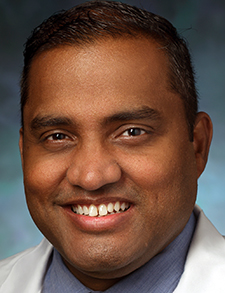
Dr. Gundareddy
Shark Tank was an innovative session where hospitalists competed in the space of innovation to improve care for their patients. The winner received a cool trophy, bragging rights, and, more importantly, mentorship for their project.
Moderator Angela Keniston, PhD, MSPH, led the session in which Ian Fagan, MD, Gilmer Rodriguez, MD, MPH, MMM, CPE, and Tokhanh Nguyen, MD, FHM, were judged by Sharks Thomas Barrett, MD, MCR, FACP, SFHM, Jennifer Myers, MD, and Pallabi Sanyal-Dey, MD, FHM.
Sharks heard the competitors’ pitches and provided them valuable insights into improving their projects.
Patients being kept nil per os (NPO) for long periods before procedures are a daily occurrence in hospitals. Dr. Fagan and his team looked at the science behind this practice and found it’s an antiquated practice still rampant across the country. This practice has direct patient harm and is not in line with the latest guidelines. Using current guidelines, the team came up with a solution that was integrated into electronic health records [EHR]. The NPO time was adjusted to 5 a.m. and 10 a.m. based on when patients were going for procedures. This avoided placing patients on NPO orders from the night before, irrespective of the procedure time. This was followed by educational initiatives to avoid unnecessary fasting before procedures and an ask to use the new EHR orders that were evidence-based. Their intervention showed an increase from 5.9% to 18.6% use of new EHR orders for internal medicine patients. The ask from the Sharks was mentorship in the design and implementation of an awareness campaign to increase uptake even more across the hospital.
Dr. Rodriguez’s group shattered readmissions and emergency return visits through transitional care innovations. His hospital had a problem with frequent re-hospitalizations and emergency department (ED) visits resulting in an overall increase in resource utilization. The value proposition included patient-centered transition services to combine high-quality outcomes at affordable costs. The team came up with a post-discharge clinic business model by the hospitalists. This post-discharge clinic followed patients until they were handed over to the primary care physician. This helped reduce readmissions and ED visits while enhancing transitional care. The ask from the Sharks was to help come up with other strategies to further improve outcomes at his hospital.
Dr. Nguyen and her team developed a patient distribution tool. The problem at hand was assigning patients to practitioner teams while ensuring geographic co-location, avoiding inconsistencies, and more importantly reducing this non-clinical work burden on hospitalists. All this was necessary while considering the various specifics of patients, clinicians, and the floors they were going to. Given the size of their hospital and the large number of services and floors, this was taking up a lot of hospitalists’ time (as much as 150 minutes). Using patient information, team availability, and decision rules for location and service, the team came up with an algorithmic approach. The data regarding the teams and patients to be assigned would be stored in a separate file. A statistical tool would process the data and generate the assignment output. This approach helped them put the right patient with the right team, removed clinician-to-clinician inconsistencies, and saved up to two hours a day of non-clinical work for hospitalists. The ask from the Sharks was mentorship in improving user adoption, an alternate platform for the algorithm to run on, and integration into electronic health records.
After questioning the competitors, the Sharks deliberated and named Dr. Fagan and his project on reducing unnecessary prolonged NPO for pre-procedural patients the winner of this year’s Shark Tank.